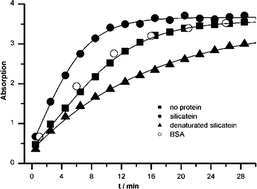Formation of silicones mediated by the sponge enzymesilicatein-α
Abstract
The sponge-restricted

- This article is part of the themed collection: New horizon of organosilicon chemistry
* Corresponding authors
a
Institute for Inorganic Chemistry, Johannes Gutenberg-University, Duesbergweg 10–14, Mainz, Germany
E-mail:
tremel@mail.uni-mainz.de
Fax: +49 6131 39-25605
Tel: +49 6131 39-25135
b
Institute for Physiological Chemistry (Applied Molecular Biology), Johannes Gutenberg-University, Duesbergweg 6, Mainz, Germany
E-mail:
wmueller@uni-mainz.de
Fax: +49 6131 39-25243
Tel: +49 6131 392 5910
The sponge-restricted

 Please wait while we load your content...
Something went wrong. Try again?
Please wait while we load your content...
Something went wrong. Try again?
S. E. Wolf, U. Schlossmacher, A. Pietuch, B. Mathiasch, Heinz-C. Schröder, W. E. G. Müller and W. Tremel, Dalton Trans., 2010, 39, 9245 DOI: 10.1039/B921640E
To request permission to reproduce material from this article, please go to the Copyright Clearance Center request page.
If you are an author contributing to an RSC publication, you do not need to request permission provided correct acknowledgement is given.
If you are the author of this article, you do not need to request permission to reproduce figures and diagrams provided correct acknowledgement is given. If you want to reproduce the whole article in a third-party publication (excluding your thesis/dissertation for which permission is not required) please go to the Copyright Clearance Center request page.
Read more about how to correctly acknowledge RSC content.
 Fetching data from CrossRef.
Fetching data from CrossRef.
This may take some time to load.
Loading related content
